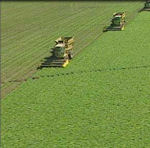 In 1997, in order to encourage students to take more challenging courses, Cornell University began posting median grades for all courses so that students could know which courses were more challenging than others. With this information in hand, students at Cornell University began flocking to the easier courses, and by 2005 the cumulative GPA of students there went up .15 points. I read of this backfired blunder in the Atlantic (June 2005), and that publication’s editorial staff wondered whether Cornell’s policy “reveals an astonishing naivete about human nature”
In 1997, in order to encourage students to take more challenging courses, Cornell University began posting median grades for all courses so that students could know which courses were more challenging than others. With this information in hand, students at Cornell University began flocking to the easier courses, and by 2005 the cumulative GPA of students there went up .15 points. I read of this backfired blunder in the Atlantic (June 2005), and that publication’s editorial staff wondered whether Cornell’s policy “reveals an astonishing naivete about human nature”
The assumption is that it is human nature not to want to work. Is this true?
Work is a curse. The Bible says so in Genesis 3.17-19. But activity has always been the natural occupation of humans. Eden was not a sedentary place. Adam and Eve were instructed to “tend and nurture” the Garden God had planted (Genesis 2.15). The curse of work given to them after the fall was not that their inactivity would be replaced by activity, but that their activity would be frustrating, difficult, and often unproductive.
What is enjoyable, fulfilling, and pleasant, then, is by definition, not work. The concentration, commitment, and sweat-equity invested in a task doesn’t make that task “work” if it is enjoyable – just ask any serious horticulturist, or tri-athlete.
The “work” curse of Genesis 3.17-19 is, of course, agricultural. It is that harvest will be hard won. Harvest, however, is not work, because it is a time of joy. In Isaiah 9.3 the prophet says that when the Messiah comes we will all “be glad in your presence with the gladness of harvest.” Harvest is a time of joy, not a time of frustration. The coming of the Messiah will usher in an age of harvest, an age of Joy.
So we should not be surprised that when Jesus looked at the crowds straining to get close to him he saw a harvest field (Matthew 9.37-38). He challenged his disciples to pray for the Lord of the Harvest to send reapers into that field. Then he did something astonishing – he told them they were the answer to their own prayers. After encouraging the prayer for reapers at the end of Matthew 9, he sends the 12 into the field on their first missionary journey in chapter 10.
The harvest joy of the messianic age is an evangelist’s joy. The harvest joy of the Messiah is not a metaphor for something, but describes the actual thing itself. There is a harvest – a harvest of souls.
This is an important distinction. Romans 5 makes clear that Jesus reverses the curses of the Garden. We often speak of evangelism, and more often think of evangelism as work (in the Genesis 3 sense of that word), when it is a harvest.
Every culture that is (or once was) based on agriculture from Bangor to Bangkok, from Berlin to Buenos Aires, has some sort of harvest celebration. Harvest time is joyous. Harvest time is our time, for we are the reapers.
We have been given the joyous part of the salvation endeavor. Countless thousands (many of whom are mentioned in Hebrews 11) did the hard work of bringing about “the fullness of time,” and Jesus made the great sacrifice of blood. Now the fields are white to harvest. Now is the time of harvest. Now is the time of joy.

